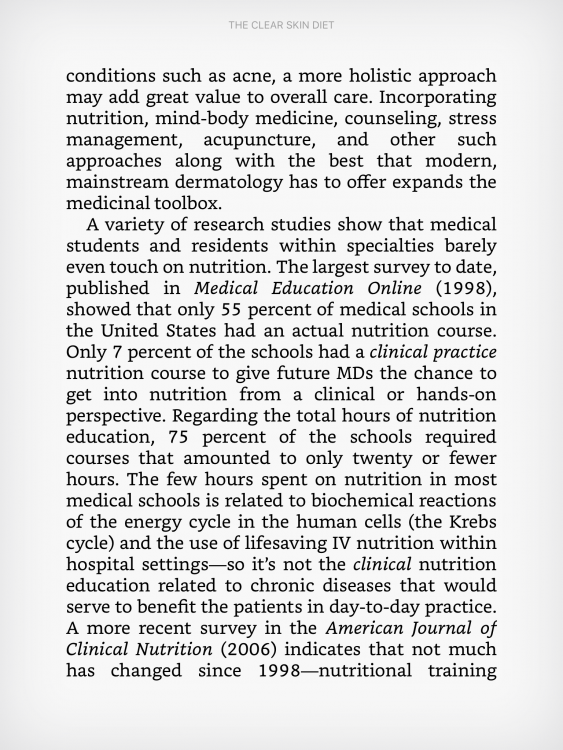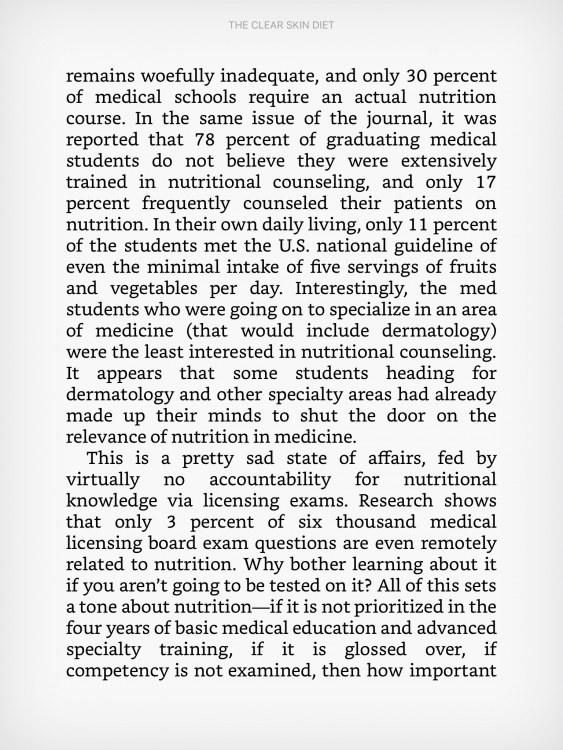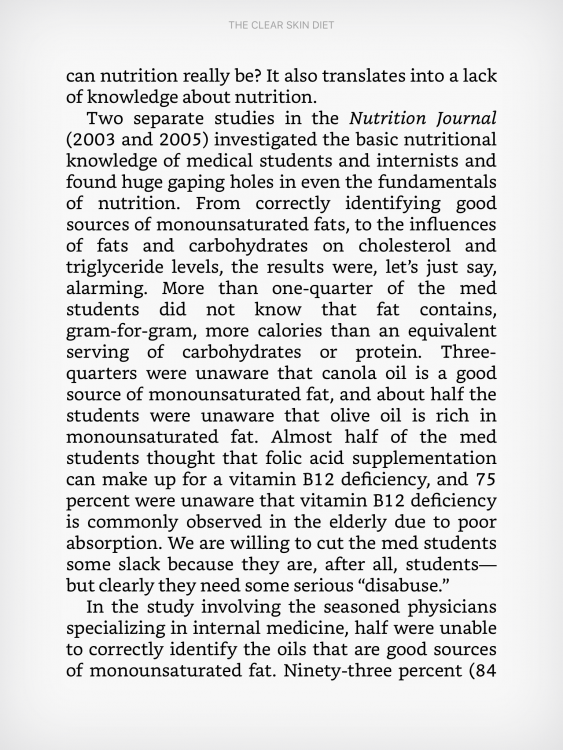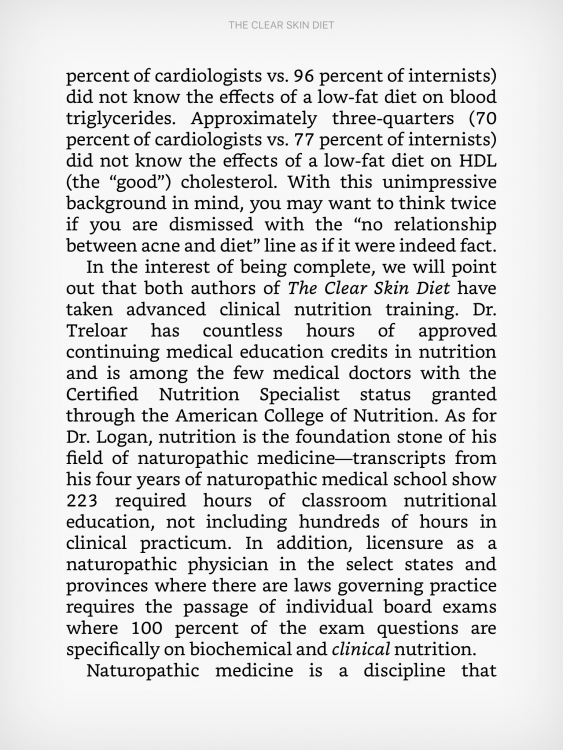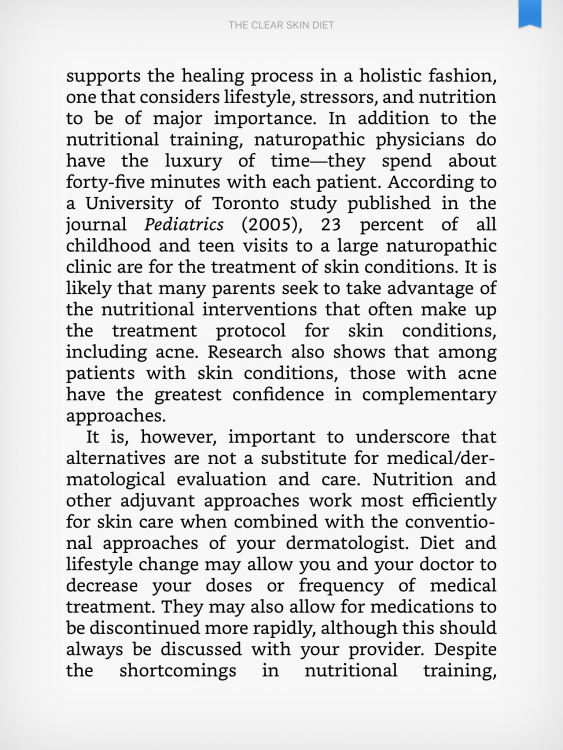Hey everyone! I implore everyone still struggling with acne to check out the e-book, "The Clear Skin Diet." I bought mine through the Kindle App(go on Amazon if you don't have the kindle app)and I am currently reading it now. I am only a few chapters in and my eyes have already been completely opened. It is 10 bucks and, trust me, it's worth it. So far, I have learned that dermatologists are rarely taught about clinical nutrition(so how can they tell us that acne is not related to diet)?! Presently, I'm learning about the benefits of Omega-3's(fish-oil in particular)and why/how they help acne. I've also learned why other cultures never experience acne, and it has nothing to do with ethnicity; it is because they consume a diet drastically different than the typical westernized diet. I'm not trying to scam anyone here. Those who have seen my posts know that I am credible, and that I try to give advice whenever I can, and that I myself am struggling with acne once again after two rounds of Accutane. I have NEVER made a post like this before, but I think it would be a crime not to share this book that has an extensive wealth of knowledge with you all. Everything in the book is backed by scientific reasoning and relevant studies. It is written by Dermatologists who know what they're talking about. If you have tried everything else, and still don't understand why you have acne(despite eating "healthy"), you really have nothing to lose by spending another 10 bucks. I've included a few screen shots from the e-book that are relevant as to why most dermatologists don't believe in the acne-diet connection. Enjoy!
The book seems to be right in the sense that nutrition for the most part is almost disregarded as a factor in health. Everybody seems to think problems are all genetic. And they certainly can be. But you can't underestimate the role of how someone is raised and their habits in terms of what they're eating.
There's a LOT to say here... but I think the confusion around why traditional diets seem to work for primitive people but not us stems partly from not recognizing that they live that way their whole lives. In other words, they are never really exposed to a modern diet. That's not the same as someone who has eaten a modern diet, had dysbiosis and then developed acne. Changing your lifestyle after the fact doesn't automatically fix everything.
We can't expect the same results as them because it's not the same.
For example... Dan of this site once wrote a post outlining his attempts to eat a traditional diet like those acne-less societies but he found that his situation didn't change. It's easy for people to conclude that diet is not the cure or could prevent acne. What people might fail to realize here is that he already had acne. He already had the disease. It's subtle but very important to see that.
It's still very possible that diet could prevent or be the cure for acne. But perhaps before acne takes root. You should start a healthy diet and live a good life from day 1, not after the fact. Prevention is the cure for modern maladies, not treatment.
Maybe the role that diet serves is to keep the microbiota in tact and in that way prevents acne in those populations. But it's important to realize that if we've lost microbial diversity in our gut ecosystems, changing diet won't fix that necessarily. It's good to eat better, but you won't be feeding species that aren't there. The modern diet can be a one-way street in that sense in that you could lose diversity, but then changing diet after doesn't make them spontaneously reappear or regain the foothold they once had.
In trying to make this as short of a post as possible, let's just draw a quick parallel. Take diabetes for instance. Even if a diabetic changes their diet, they're still diabetic, right? Point is, we tend to think of acne as being somehow different from other diseases of civilization that entail chronic inflammation and the like. Having a diabetic simply eat better after they become diabetic doesn't just make the beta cells of the pancreas grow back. In the case of acne, we tend to assume that if we just change our diet, then acne will disappear. And chances are it just doesn't work like that.
We know that diet can increase one's risk for diabetes. Why couldn't the same be true for acne? So if we're looking at it that way... could diet be a œcure? Depends on how you look at it. Yes in the sense that perhaps it could prevent the risk for diabetes. But will it cure a diabetic after they become that way? Not necessarily.
So diet could be both a yes and no answer for a œcure. I know that sounds confusing, but give it some thought.
Of course it's not actually known the true hard scientific answer as to the precise cause of acne. But whatever it is, those primitive people seem to have it on lockdown, and the thing that most boldly stands out for them is their utter absence from the modern food systems of the world. Remember what I said though about their adherence all along. Being reactive is different than being proactive. The difference between prevention and treatment.
It's also interesting to note that for one of those groups, they exhibit no signs of either acne OR diabetes.
Here are some pictures of them. What's amazing is that this woman is wearing no makeup or anything of the sort. They simply don't have access to acne medications or things of that nature. When they say no acne, they mean it!
3 hours ago, FvckAcne said:The book seems to be right in the sense that nutrition for the most part is almost disregarded as a factor in health. Everybody seems to think problems are all genetic. And they certainly can be. But you can't underestimate the role of how someone is raised and their habits in terms of what they're eating.
There's a LOT to say here... but I think the confusion around why traditional diets seem to work for primitive people but not us stems partly from not recognizing that they live that way their whole lives. In other words, they are never really exposed to a modern diet. That's not the same as someone who has eaten a modern diet, had dysbiosis and then developed acne. Changing your lifestyle after the fact doesn't automatically fix everything.
We can't expect the same results as them because it's not the same.
For example... Dan of this site once wrote a post outlining his attempts to eat a traditional diet like those acne-less societies but he found that his situation didn't change. It's easy for people to conclude that diet is not the cure or could prevent acne. What people might fail to realize here is that he already had acne. He already had the disease. It's subtle but very important to see that.
It's still very possible that diet could prevent or be the cure for acne. But perhaps before acne takes root. You should start a healthy diet and live a good life from day 1, not after the fact. Prevention is the cure for modern maladies, not treatment.
Maybe the role that diet serves is to keep the microbiota in tact and in that way prevents acne in those populations. But it's important to realize that if we've lost microbial diversity in our gut ecosystems, changing diet won't fix that necessarily. It's good to eat better, but you won't be feeding species that aren't there. The modern diet can be a one-way street in that sense in that you could lose diversity, but then changing diet after doesn't make them spontaneously reappear or regain the foothold they once had.
In trying to make this as short of a post as possible, let's just draw a quick parallel. Take diabetes for instance. Even if a diabetic changes their diet, they're still diabetic, right? Point is, we tend to think of acne as being somehow different from other diseases of civilization that entail chronic inflammation and the like. Having a diabetic simply eat better after they become diabetic doesn't just make the beta cells of the pancreas grow back. In the case of acne, we tend to assume that if we just change our diet, then acne will disappear. And chances are it just doesn't work like that.
We know that diet can increase one's risk for diabetes. Why couldn't the same be true for acne? So if we're looking at it that way... could diet be a œcure? Depends on how you look at it. Yes in the sense that perhaps it could prevent the risk for diabetes. But will it cure a diabetic after they become that way? Not necessarily.
So diet could be both a yes and no answer for a œcure. I know that sounds confusing, but give it some thought.
Of course it's not actually known the true hard scientific answer as to the precise cause of acne. But whatever it is, those primitive people seem to have it on lockdown, and the thing that most boldly stands out for them is their utter absence from the modern food systems of the world. Remember what I said though about their adherence all along. Being reactive is different than being proactive. The difference between prevention and treatment.
It's also interesting to note that for one of those groups, they exhibit no signs of either acne OR diabetes.
Here are some pictures of them. What's amazing is that this woman is wearing no makeup or anything of the sort. They simply don't have access to acne medications or things of that nature. When they say no acne, they mean it!
You make some good points, however the author's never claim that diet is a cure-all. If you read the book, you would have known that. That being said, the authors certainly make the case that diet(this includes vitamin supplementation) can significantly improve acne. Combine an adequate diet with a good skincare regime and many people can expect clear skin. The two components work synergistically. I'm glad you mentioned Diabetes. While what you have stated has merit in regards to Type I Diabetes, Type II Diabetes is much different in regards to the role diet/lifestyle plays in managing the disease. In fact, those with type II diabetes can completely eradicate the need for medication through healthy eating and lifestyle choices. Will they still be Diabetic? Of course. Will they have the symptoms of one? No(unless they stop managing their disease). The point is, most diseases can be managed, including acne. In respect to your example about Dan, the book provides evidence on how genes are affected and manipulated due to dietary abuse in prior generations. So you're right, perhaps he can't prevent his predisposition to acne(a result of manipulated genes over time). Have you ever considered why some diseases run in families? That is part of the reason why. Of course, I am simplifying all of this for the sake of time, but the book explains it in great depth, if you wish to read it. Btw, I study medicine so I am well-versed in the mechanisms and treatments of many diseases. Thank you for your input, though. Read the book, and I promise your preconceived notions will change. =) It's really much more complex than the title implies.
In no way was I attacking the book. Those first few sentences had more to do with doctors having little training in the area of nutrition and how more often they seem to simply offer prescriptions rather than ask about patient lifestyle. The first sentence in that second paragraph of the first picture you post highlights what I'm talking about.
I don't quite see where you're coming from with that first sentence though. I never said the authors claimed diet is a cure all. Personally I have some family members with both type I and II diabetes. I'm aware that type I and II can be managed differently. But at the end of the day, diabetes is still an autoimmune problem. Since the immune system operates largely from the gut, the role of diet can't be underestimated in prevention.
Maybe the wording was off. But it was only that first sentence I wrote that really was related to the book. But since the title of that book is the clear skin DIET, that's where the rest of the post comes in. This is posted in the diet & holistic health section of the forum so it's not out of place.
Whether you study medicine or not is irrelavant. As it stands, neither you nor the rest of science or the medical community has a solution to the acne problem. Qualifications don't impress me, sorry.
edit: Actually, hold up a second. I wasn't logged in for a second there and the board blocked some of your post.
I don't think you see what I meant when I mentioned Dan. I didn't mean that it was inherited. What I mean is not genetic abuse from some prior generation or whatever. But that processed foods may be able to start the acne process rolling. And that by simply changing diet after that fact won't necessarily fix things. Maybe there's another way word it. Maybe the simplest way to put it is that our modern lifestyle can set the stage for conditions that are very hard to reverse, but don't have to be genetic or inevitable e.g. dysbiosis.
In other words you've been hit by the drive-by that is corporate america. heh. CAFO's aren't the only place cows are raised in this country. Your neighbor is probably making the transition as we speak. We just get acne rather than put on weight.
Really though...
That is to say, if acne is associated with dysbiosis, and dan had acne, then mimicking a diet of people who probably don't have dysbiosis wouldn't yield the same results. And that even if it didn't work for Dan, their diet is still likely responsible for their clear skin, such as by not having dysbiosis induced in them by a diet that is likely to cause it. I'm referring here to those people who say things like "diet and acne is a myth. It's been debunked. There is no association and diet doesn't have the potential to prevent acne." To say that may be only half-true, and depends on how you're perceiving things at different points in time.
The paper from 1971 on the eskimos is a good example of what I mean. It was only when a modern diet was really introduced to them - with refined sugar, etc - that the rates of acne and diabetes increased dramatically. To me, that doesn't seem like a prior generation genetic-abuse sort of thing. It's the introduction of something that wasn't there before. And with the thought of acne being associated with SIBO and the sensitivity of FODMAPs i.e. "healthy" foods also makes acne seem less like a genetic abuse scandal and more like a bacterial fermentation problem. Also, with lowered GSH and antioxidants in acne, that sounds like an infection of some kind and not genetic. Endotoxin and dysbiosis can do that by being a burden on the immune system. Because the immune system creates reactive oxygen species to deal with invading microbes, it can tax the antioxidant system.
As a side note, that's also why omega-3's can be problematic in many cases. They are long-chain unsaturated fatty acids that are highly prone to oxidation. That spells trouble in an environment awash with free radicals. Sure, they serve a biological role in small amounts. But so far, I haven't heard of anyone curing acne with fish oil.
The reality is that a diet full of sugar is just begging a bacterial overgrowth to happen. And that's not to mention pesticides that are probably nerve-toxic when we're talking about SIBO and lackluster gut motility.
Is what I said about Dan a little clearer? A western diet of sugar, etc can initiate a bacterial overgrowth, but just eating differently doesn't necessarily eradicate it. Neither would probiotics, since they are bacteria themselves. And thus the thought "diet doesn't work" arises.
In sum: a diet typical of an average american can mess you up in ways that can persist for years, and in ways that science can't even manage to understand.
It may not be that those people above eat some specific anti-acne diet. It may be as simple as the fact that they just never adopted what we have come to know as a western lifestyle. That's significant when you remember what I said about dysbiosis.
By most estimates, western foods comprise less than 1% of their overall diet. And they spend on average only $3 on western products yearly. Since most of them smoke tobacco, that's probably just cigarettes too.
But the reason I don't think they have some specific anti-acne regimen is that there are other groups like them, who are not genetically related and geographically in separate areas. And they too eschew modern society. The common thread seems to be that they are traditional subsistence farmers who live outside of the way we do. But each of them eats a different diet. So I don't see some magical anti-acne food for them.
One good point that I've seen someone say is that they simply don't have the technology to degrade their food and pump it full of chemicals and antibiotics and god knows what else.
However, the epigenetic angle you're coming with does have merit. And in some ways, eating corporately produced garbage can be considered a form of abuse heh.
The question for us now that we have it is how the hell do we get rid of it? The answer seems elusive as ever.
49 minutes ago, FvckAcne said:In no way was I attacking the book. Those first few sentences had more to do with doctors having little training in the area of nutrition and how more often they seem to simply offer prescriptions rather than ask about patient lifestyle. The first sentence in that second paragraph of the first picture you post highlights what I'm talking about.
I don't quite see where you're coming from with that first sentence though. I never said the authors claimed diet is a cure all. Personally I have some family members with both type I and II diabetes. I'm aware that type I and II can be managed differently. But at the end of the day, diabetes is still an autoimmune problem. Since the immune system operates largely from the gut, the role of diet can't be underestimated in prevention.
Maybe the wording was off. But it was only that first sentence I wrote that really was related to the book. But since the title of that book is the clear skin DIET, that's where the rest of the post comes in. This is posted in the diet & holistic health section of the forum so it's not out of place.
Whether you study medicine or not is irrelavant. As it stands, neither you nor the rest of science or the medical community has a solution to the acne problem. Qualifications don't impress me, sorry.
"We know that diet can increase one's risk for diabetes. Why couldn't the same be true for acne? So if we're looking at it that way... could diet be a cure? Depends on how you look at it. Yes in the sense that perhaps it could prevent the risk for diabetes. But will it cure a diabetic after they become that way? Not necessarily." You reference "cure" quite a bit, so that is why I addressed it. I'm happy to hear that you understand the different types of Diabetes, but from the statements you made, it did not appear so. I apologize. I can see that you are attempting to start a debate with me, which is great(I love debates), but a lot of what you're saying is irrelevant to a)my post and b)what the book is about. That is why I am confused as to why you initiated this debate as you have nearly no idea what the book discusses(aside from my brief description and the title). You can't really begin a debate without ALL of the information(well, you can but it doesn't make much sense). If you had read the book, then tried to debate some of the points, I could understand your position. You have ingested a very small amount of information that is out of context from the entirety of the book. I would love to debate with you afteryou have consumedallof the information that the book outlines.Also, I only stated I study medicine to prove my credibility since I was speaking on the topic of disease(specifically Diabetes). Your credibility lies in the fact that you have family members with Diabetes, mine is through study and application; make sense? Trust me, I'm not attempting to impress anyone. Haha. I simply wanted to share a resource with the community here. It may or may not be helpful, but it should not be judged before it is even read. I'm not going to continue to debate though, that was not the purpose of this post. Have a wonderful evening.
Hold on, I just read your edit, give me a chance to respond lol.
I'm not saying that ALL acne is due to a genetic disposition. I'm saying that SOME people are predisposed to it and that there are reasons for that disposition.
"The paper from 1971 on the eskimos is a good example of what I mean. It was only when a modern diet was really introduced to them - with refined sugar, etc - that the rates of acne and diabetes increased dramatically. To me, that doesn't seem like a prior generation genetic-abuse sort of thing. It's the introduction of something that wasn't there before.."<<<< I agree with this completely! In fact, the book references similar studies to this one in an effort to demonstrate the acne-diet link.
I'm certainly not stating that anything in this book isfact, but everything discussed is based off of science and evidence.There aremanyfactors in the manifestation of acne, and the book makes that very clear. I know the title is "the clear skin diet", but like i said the book is much more complex than what it seems. The author's address many different ways to improve acne(diet is the chief component, but not the sole component). My main point to you is that, I would like for you to read the bookin contextbefore you speak on it, because it's complex. I do really hope you buy it so we can debate it thoroughly. =)
Edit: I see why what I said was confusingin regards to what I said about Dan/genetics.I missed a word(perhaps)so my statement should have read like this:"So you're right, perhaps he can't prevent his predisposition to acne(a result of manipulated genes over time). Have you ever considered why some diseases run in families?"
1 hour ago, FvckAcne said:In no way was I attacking the book. Those first few sentences had more to do with doctors having little training in the area of nutrition and how more often they seem to simply offer prescriptions rather than ask about patient lifestyle. The first sentence in that second paragraph of the first picture you post highlights what I'm talking about.
I don't quite see where you're coming from with that first sentence though. I never said the authors claimed diet is a cure all. Personally I have some family members with both type I and II diabetes. I'm aware that type I and II can be managed differently. But at the end of the day, diabetes is still an autoimmune problem. Since the immune system operates largely from the gut, the role of diet can't be underestimated in prevention.
Maybe the wording was off. But it was only that first sentence I wrote that really was related to the book. But since the title of that book is the clear skin DIET, that's where the rest of the post comes in. This is posted in the diet & holistic health section of the forum so it's not out of place.
Whether you study medicine or not is irrelavant. As it stands, neither you nor the rest of science or the medical community has a solution to the acne problem. Qualifications don't impress me, sorry.
edit: Actually, hold up a second. I wasn't logged in for a second there and the board blocked some of your post.
I don't think you see what I meant when I mentioned Dan. I didn't mean that it was inherited. What I mean is not genetic abuse from some prior generation or whatever. But that processed foods may be able to start the acne process rolling. And that by simply changing diet after that fact won't necessarily fix things. Maybe there's another way word it. Maybe the simplest way to put it is that our modern lifestyle can set the stage for conditions that are very hard to reverse, but don't have to be genetic e.g. dysbiosis.
That is to say, if acne is associated with dysbiosis, and dan had acne, then mimicking a diet of people who probably don't have dysbiosis wouldn't yeild the same results.
The paper from 1971 on the eskimos is a good example of what I mean. It was only when a modern diet was really introduced to them - with refined sugar, etc - that the rates of acne and diabetes increased dramatically. To me, that doesn't seem like a prior generation genetic-abuse sort of thing. It's the introduction of something that wasn't there before. And with the thought of acne being associated with SIBO and the sensitivity of FODMAPs i.e. "healthy" foods also makes acne seem less like a genetic abuse scandal and more like a bacterial fermentation problem. Also, with lowered GSH and antioxidants in acne, that sounds like an infection of some kind and not genetic. Endotoxin and dysbiosis can do that by being a burden on the immune system. Because the immune system creates reactive oxygen species to deal with invading microbes, it can tax the antioxidant system.
As a side note, that's also why omega-3's can be problematic in many cases. They are long-chain unsaturated fatty acids that are highly prone to oxidation. That spells trouble in an environment awash with free radicals. Sure, they serve a biological role in small amounts. But so far, I haven't heard of anyone curing acne with fish oil.
The reality is that a diet full of sugar is just begging a bacterial overgrowth to happen. And that's not to mention pesticides that are probably nerve-toxic when we're talking about SIBO and lackluster gut motility.
Is what I said about Dan a little clearer? A western diet of sugar, etc can initiate a bacterial overgrowth, but just eating differently doesn't necessarily eradicate it. Neither would probiotics, since they are bacteria themselves. And thus the thought "diet doesn't work" arises.
However, the epigenetic angle you're coming with does have merit. And in some ways, eating corporately produced garbage can be considered a form of abuse heh.
Stop editing lmao(I'm just as bad), Give me a second to read it.
32 minutes ago, FvckAcne said:Haha yeah I wasn't logged in and shit got jacked up so I just kept editing. Sounds like a misunderstanding based on my choice of words.
Anyways, back to the book.
I posted this for those who still have acne (despite countless treatments), and are interested in learning about the link between acne and diet. This book makes no promises that the methodologies taught will completely clear you up. The author's emphasize that diet plays a key role in an acne patient's treatment plan, but for some it may not be enough. People with severe acne will likely need a multi-pronged approach, but diet should be part of that approach. You obviously agree with me in regards to the fact that certain cultures have better skin than those in westernized cultures. There's a reason for that. So, while we can't reverse the habits of our past, we can learn from those cultures and use healthy diet as atoolin our anti-acne arsenal. That is what the book is about. I think it's obvious that there is no one-size-fits all approach to tackling acne, so I didn't feel the need to issue a disclaimer. The book does, however, which is why you should read it(there is no possible way that I can summarize all of the contents of this book, because it would be taken out of context). It needs to be read in its entirety.
I see. Yeah I mean diet is probably the most effective management tool as you say. That part we definitely agree on.
What are some of the main points of it though? I mean, I checked it out briefly on amazon but for the most part I've already heard most of the stuff out there about omega-3's, zinc, D3, antioxidants, SIBO, probiotics, foods, etc. I mean, really, I've read a LOT of shit, over quite a number of years and countless studies on all sorts of topics so there's not much out there that's novel in that sense. I always consider myself a student of life but honestly it just seems like I've seen just about everything, even though I know I haven't - your book in particular haha.. Everything from salt, iodine, gut, pesticides, hormones, probiotic strains, oxidative stress, traditional societies, I mean it's just fuckin crazy. Looked into all of them in some excruciating detail. It's so much information that I've considered authoring a book myself.
To that end, it'd be nice if you just gave a broader preview of the topics covered though so we could talk about that.
I think it's interesting though why we tend to believe that diet (a preventive one) isn't the answer to acne by and large. It's just about seeing how lied to and ripped off we are by the food systems in place that sell us trash and all the anti-consumer legislation they pass to keep the masses ignorant of what they eat to protect the bottom line.
It makes sense that they wouldn't promise it works for everyone. But when I think about why diet is more effective for some people and not others, I always think about oxidative stress. That is, the intensity of oxidative stress may be a factor there. The antioxidants gained from food may not be enough to overcome that burden. So it's not so much that diet is ineffective, as the food does have the necessary nutrients, it's just that it's not enough since with a high burden of oxidation, those nutrients would be eaten up quickly, particularly the antioxidants. I wrote a post a while back on antibiotics i.e. minocycline, etc for acne and how they act as free-radical scavengers more than antimicrobials.
It covers everything you have mentioned, in addition to how to regulate our hormones, the effect of stress on our skin, and inflammation in great detail with practical solutions. The prevailing theme, however, is how truly misinformed most of the medical community is(especially dermatologists). It examines the outdated studies that lead to the myth that diet has no role acne(which dermatologists still take as fact). The way the studies were conducted was abhorrent to say the least. It explains how most of what dermatologists learn about acne and diet is based on pseudoscience. The book also examines the harm that pharmacological companies impart the medical communityas a whole. I wasn't shocked when I read all of this, but I did feel validated in that what I suspected was correct. Keep in mind, this book can be revolutionary to those who have not done as much research as you and I. The dermatologists aren't purposely telling lies to their patients but they are still spreading myths regardless of intent. It is quite sad. Basically, this book reassured me that we should do our own research as well when it comes to our health.
Edit: I didn't see that you mentioned hormones, and stress, but I have never read a book that went into as much detail as this one so I think you would still learn a few additional things.
Definitely. I don't believe doctors are bad people. They're just the smaller fish in a larger system, really. I know the guy at acneeinstein wrote some stuff a long time ago about studies conducted in the 60's and what not. The chocolate studies or whatever. So it's not surprising that there's been such little progress.
What isn't so well known is a doctor by the name of Broda Barnes. I have his book on hypothyroidism from 1976 I believe it was. In that book, he draws a connection between thyroid and acne, detailing how a 60 year old man who had acne his whole life cleared up his cystic acne covered back entirely with the administration of thyroid hormone. And that really changed my perspective on acne. So I did a lot of research on Iodine and etc. Keep in mind, this guy knew this as early as the 70s! But it really got me thinking about chemicals and herbicides and etc. and how they are endocrine disrupting agents, along with killing gut bacteria like Monsanto's glyphosate in Roundup by its mechanism of action in inhibiting the shikimate pathway. What also isn't so well known is that thyroid hormone has a massive number of functions in the body. It's really quite an amazing hormone - Triiodothyronine. And it's testament to how critical of a nutrient Iodine really is.
15 minutes ago, FvckAcne said:Definitely. I don't believe doctors are bad people. They're just the smaller fish in a larger system, really. I know the guy at acneeinstein wrote some stuff a long time ago about studies conducted in the 60's and what not. The chocolate studies or whatever. So it's not surprising that there's been such little progress.
What isn't so well known is a doctor by the name of Broda Barnes. I have his book on hypothyroidism from 1976 I believe it was. In that book, he draws a connection between thyroid and acne, detailing how a 60 year old man who had acne his whole life cleared up his cystic acne covered back entirely with the administration of thyroid hormone. And that really changed my perspective on acne. So I did a lot of research on Iodine and etc. Keep in mind, this guy knew this as early as the 70s! But it really got me thinking about chemicals and herbicides and etc. and how they are endocrine disrupting agents. What also isn't so well known is that thyroid hormone has a massive number of functions in the body. It's really quite an amazing hormone - Triiodothyronine
Yes! The thyroid was my favorite gland that we learned about in school. It's relationship with the pituitary gland is quite remarkable. Since the pituitary gland is the "master gland" of the body it is responsible for several mechanisms in the endocrine system. That book sounds really interesting.
Good post guys ![]()
From what I understand acne has a few components: genetics, diet, certain deficiencies, inflammation and environment. And adding good food in is as important as taking bad foods out
10 hours ago, MonroeQT said:It covers everything you have mentioned, in addition to how to regulate our hormones, the effect of stress on our skin, and inflammation in great detail with practical solutions. The prevailing theme, however, is how truly misinformed most of the medical community is(especially dermatologists). It examines the outdated studies that lead to the myth that diet has no role acne(which dermatologists still take as fact). The way the studies were conducted was abhorrent to say the least. It explains how most of what dermatologists learn about acne and diet is based on pseudoscience. The book also examines the harm that pharmacological companies impart on medicine as a whole. I wasn't shocked when I read all of this, but I did feel validated in that what I suspected was correct. Keep in mind, this book can be revolutionary to those who have not done as much research as you and I. The dermatologists aren't purposely telling lies to their patients but they are still spreading myths regardless of intent. It is quite sad. Basically, this book reassured me that we should do our own research as well when it comes to our health.
Edit: I didn't see that you mentioned hormones, and stress, but I have never read a book that went into as much detail as this one so I think you would still learn a few additional things.
#CanIGetAnAmen
9 hours ago, snarkygirl said:Good post guys
From what I understand acne has a few components: genetics, diet, certain deficiencies, inflammation and environment. And adding good food in is as important as taking bad foods out
Yes! There are many components that need to be taken into consideration in order to achieve homeostasis. The focus on diet isn't as restrictive as you would think. In fact, most of the "diet" is more about adding good foods and supplements. The only foods they suggest to limit are saturated fats, trans fats, excessive omega-6 fatty acids, dietary sugar, and non-fermented dairy.
I did finish reading this book too! I do love that it has inspired me to really dramatically improve my diet. I think that no matter it's for our acne issue or overall physical or emotional health, eating healthy is always a good idea.
While I don't regret improving my diet because I find eliminating a lot of processed food and making more healthy choices do help control the inflammation of my acne, I have to say that I'm not so sure about the supplement part.
In the book the author stresses heavily on the importance of having healthy gut and how it can be related to our acne, so he also recommends taking probiotics supplements - that's what I followed right away. I'm still not sure if this is the cause, but I'd been feeling more fatigued and also breaking out worse since taking it. And not long after I came off of it, I got a severe stomach flu. I just feel like maybe everybody reacts differently to supplements.
Anyway I would still definitely recommend this book to everyone who has been struggling to take one step further to improve their diet. But then I think it is not as magical as many people would expect. After all, like the author has also noted, if the root cause of the acne is not dealt with, such as hormonal imbalance or stress, a diet can only help so much.
8 hours ago, Jennifer Cheung said:I did finish reading this book too! I do love that it has inspired me to really dramatically improve my diet. I think that no matter it's for our acne issue or overall physical or emotional health, eating healthy is always a good idea.
While I don't regret improving my diet because I find eliminating a lot of processed food and making more healthy choices do help control the inflammation of my acne, I have to say that I'm not so sure about the supplement part.
In the book the author stresses heavily on the importance of having healthy gut and how it can be related to our acne, so he also recommends taking probiotics supplements - that's what I followed right away. I'm still not sure if this is the cause, but I'd been feeling more fatigued and also breaking out worse since taking it. And not long after I came off of it, I got a severe stomach flu. I just feel like maybe everybody reacts differently to supplements.
Anyway I would still definitely recommend this book to everyone who has been struggling to take one step further to improve their diet. But then I think it is not as magical as many people would expect. After all, like the author has also noted, if the root cause of the acne is not dealt with, such as hormonal imbalance or stress, a diet can only help so much.
Yes, exactly. The authors make it very clear that diet won't solve everything. I do agree that supplementation can be very personal. For example, the authors make the case that omega-3s are great for inflammatory related conditions, but I know some people break out when they consume too much omega-3s. Overall, I like that the book is practical. I'm sure we've all read books or articles where the author touts that their approach will work for 99.999 percent of the population, but that is BS. We are all different, so while the advice given in the book will be beneficial to some, it may not be beneficial for others. The book acknowledges that, too.
 Acne.org Products
Acne.org Products